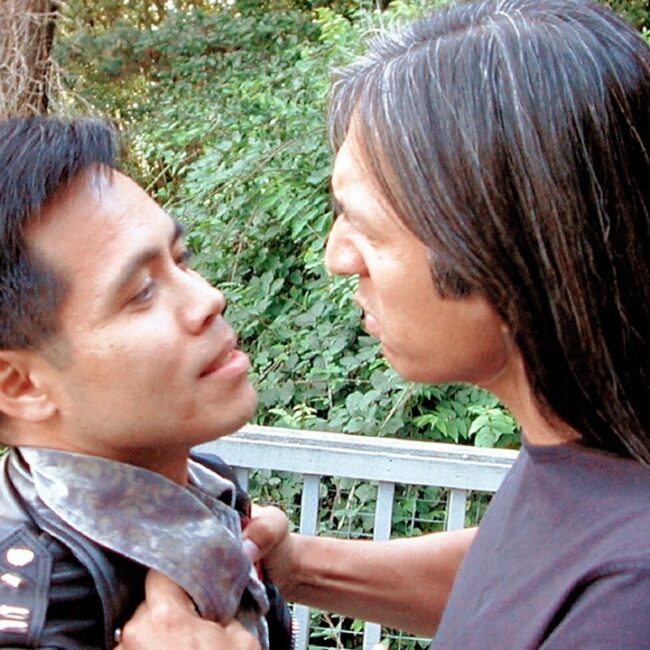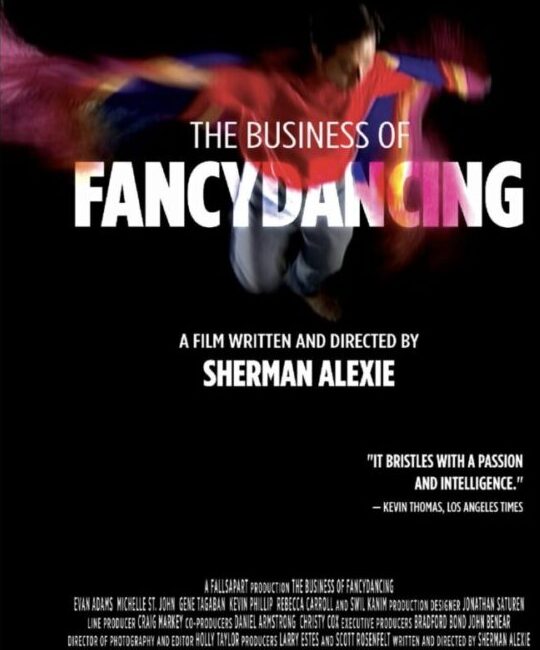 My Film Title of the Year award goes to The Business of Fancydancing, although it’s in fact a re-release of Sherman Alexie’s 2002 Native American indie drama. What a genius title! Alexie, a Native American himself, examines the lives of a few characters around the Spokane tribe. The chief protagonist is Seymour Polatkin (Evan Adams), a handsome young gay poet who left the tribe to go to university and has gone on to achieve widespread success as a poet. He lives with his boyfriend Steven (Kevin Phillip) in an apartment in Seattle. Seymour enjoyed a fun childhood on the reservation, hanging out with his best friends Aristotle (the very handsome Gene Tagaban) and Mouse (Swil Kanim). However, post-university, he realised that life on the reservation would be too limiting for his young, ambitious, queer self, and he hasn’t been back to the reservation for many years.
My Film Title of the Year award goes to The Business of Fancydancing, although it’s in fact a re-release of Sherman Alexie’s 2002 Native American indie drama. What a genius title! Alexie, a Native American himself, examines the lives of a few characters around the Spokane tribe. The chief protagonist is Seymour Polatkin (Evan Adams), a handsome young gay poet who left the tribe to go to university and has gone on to achieve widespread success as a poet. He lives with his boyfriend Steven (Kevin Phillip) in an apartment in Seattle. Seymour enjoyed a fun childhood on the reservation, hanging out with his best friends Aristotle (the very handsome Gene Tagaban) and Mouse (Swil Kanim). However, post-university, he realised that life on the reservation would be too limiting for his young, ambitious, queer self, and he hasn’t been back to the reservation for many years.

Despite, for various reasons, having lost touch with both Aristotle and Mouse, it is the sudden death of violinist Mouse that brings Seymour back to the camp. This triggers many emotions and memories, including with his estranged friend Aristotle and also with Agnes (Michelle St. John), a half Jewish, half Spokane woman whom Seymour dated at university, who has now moved to the camp to work as a teacher. She is the only women he has slept with, alongside over one hundred men, but they had had a good time together. How is Seymour’s return to the camp going to pan out for him?
Alexie has taken a novel approach to storytelling, with a very non-linear series of scenes spanning almost twenty years to introduce the characters. It can take a while to work out who is who and what is going on, but the confusion settles once you realise the pattern of proceedings. Seymour and Agnes are the most well-formed, mature characters and take the lead over Aristotle and Mouse who are held back by not letting go of life on the reservation. All the cast gel well in these roles. The themes are somewhat bleak at times, covering substance abuse (a bathroom cleaner sandwich anyone?), racism, the blurred line between truth and fiction, tribal traditions, poor evolution and life expectancy amongst the Native American Indian population.
Seymour’s life as a two-spirit (gay) poet is, however, considered a success by some of his contemporaries. “What’s it like when white people pay attention?” one asks. Others think he has sold out and abandoned them. There’s an undercurrent of beautiful poetry – including self-analysis by Seymour – running through the film which is one of its highlights. As well as learning about the characters through poetry, a novel series of fake TV interviews and on-screen text also feed us character information. Despite being over twenty years old, the film hasn’t dated and the issues raised remain as relevant as ever. There’s a lot going on here, and not every sub-plot is developed to its full potential. This, together with the sometimes-haphazard editing across different time periods, might make the film difficult for some to follow. For me it is a beautiful character study of a minority queer man. 8/10
| Queerguru’s Contributing Editor Ris Fatah is a successful fashion/luxury business consultant (when he can be bothered) who divides and wastes his time between London and Ibiza. He is a lover of all things queer, feminist, and human rights in general. @ris.fatah |

